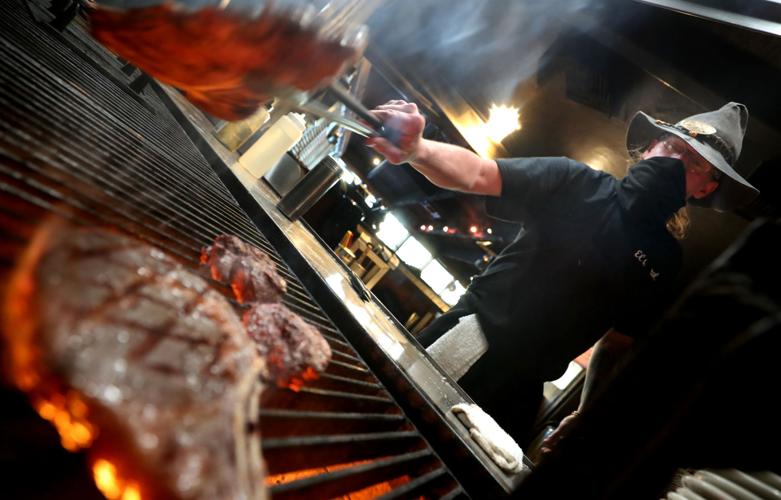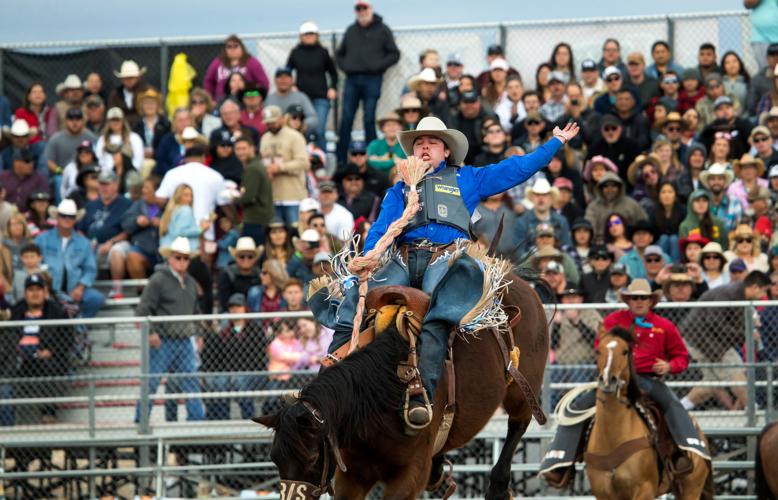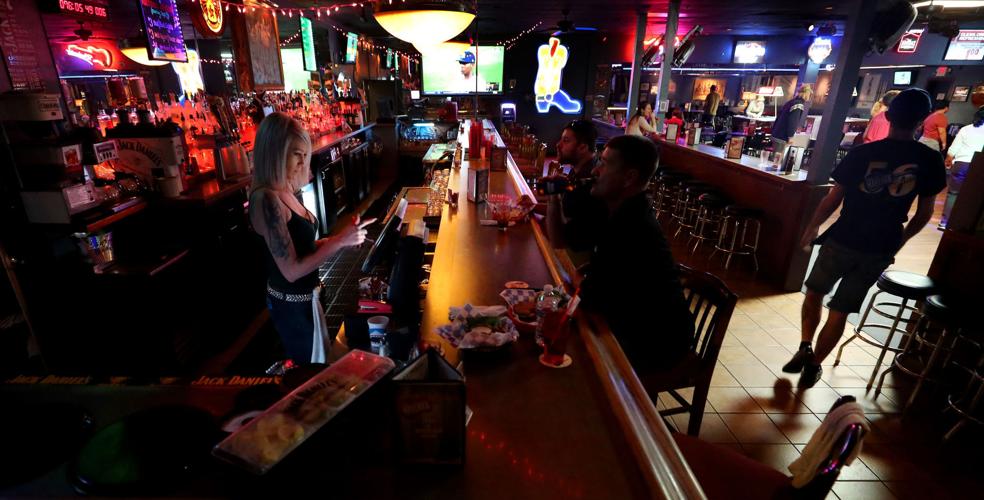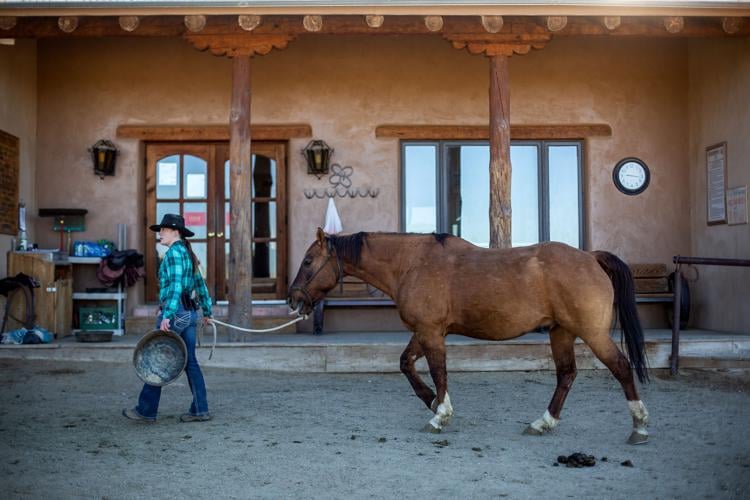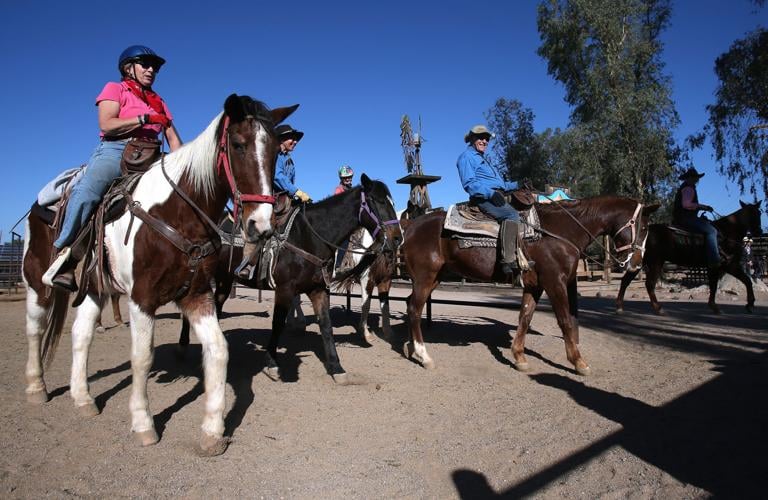The Tucson Rodeo Grounds are quiet this weekend, and there are no horses clip-clopping down South Park Avenue for the annual Tucson Rodeo Parade.
But that doesn’t mean Tucson is putting its love of its Old West history on the shelf because of the COVID-19 pandemic.
You can still get a cowboy steak dinner that rivals the best offered in the rodeo capitals of Texas and Wyoming, and a handful of Tucson country singers have gigs this weekend at the legendary Maverick King of Clubs and the newbie Whiskey Roads in Marana.
There are dude ranches and horseback trails that can fill some of the void after the organizers of the 96th annual La Fiesta de los Vaqueros rodeo postponed the event until February 2022.

Saddle bronc rider Jesse Wright rides No Show Jones during the saddle bronc riding event that he won at last year’s La Fiesta de los Vaqueros.
The rodeo was set to go Feb. 20-28, but officials announced in late November that it was off as the state’s COVID-19 rates continued to rise late last year.
Less than a week later, organizers of the parade, which is celebrating its 95th year, pulled the plug in a move officials called proactive, given the pandemic’s state of affairs.
The rodeo, billed as the largest winter rodeo in the U.S., has been a tradition for generations of Tucsonans. It’s an official school holiday — kids get two days off from school this weekend, a tradition that has been ongoing for as long as most can remember — and parents often plan a long weekend around rodeo break.
But just because that’s changing this year doesn’t mean you can’t create your own homage to all things Tucson rodeo.
Cowboy food
Let’s start with the ubiquitous cowboy grub — steak grilled on an open flame. Most serve it with cowboy or ranch beans, Texas toast and a baked potato.
2735 W. Anklam Road, 792-8888; daisymaessteakhouse.com
Hours: 4 to 10 p.m. Mondays-Saturdays, until 9 p.m. Sundays
They have dollar bills scribbled with notes stapled and taped to the wall, and every once in a long while they will take those bills down and donate them to a worthy cause. But the big draw here is sitting in the dining room and peeking out on the patio to see the embers from the mesquite wood flicker as a juicy steak hits the grill. They have rib eye, porterhouse, T-bones and sirloin cuts, all served with their hearty cowboy beans, a side salad and baked potato. (You’ll want to ask for a doggie bag so you can save room for their housemade apple pie a la mode or fudgey, creamy turtle cheesecake.)

A cowboy suit worn by legendary Western performer Tom Mix is on display at El Corral restaurant in Tucson.
2201 E. River Road, 299-6092; elcorraltucson.com
Hours: 5 to 9 p.m. daily, takeout available beginning at 2 p.m.
This is where you go for some of the area’s best prime rib, and the folks at El Corral have spent more than 50 years perfecting their slow-roasted, perfectly pink, almost fork-tender beef, served with a side of their house-favorite tamale pie. You can order the signature El Corral cut, or go for the Catalina Cut, billed as “big as the Catalinas.” El Corral is one of the area’s oldest steakhouses, dating to 1926, and one of their rodeo staples is the Rocky Mountain Oysters, made from veal testicles. Even though the rodeo is off, the oysters will be on the menu, said General Manager Debbie Backous.
8501 N. Silverbell Road in Marana, 744 2800; lilabnerssteakhouse.com
Hours: 5 to 9 p.m. Sundays through Thursdays, until 10 p.m. Fridays and Saturdays
Old license plates from around the country line the walls of this rustic steakhouse mainstay, a restaurant that started life as a bar along the then barren expanse of farmland and open fields against the backdrop of the nearby Tucson Mountains. Drive down North Silverbell Road on a warm spring night with your windows rolled down to inhale the succulent fragrance of mesquite smoke from the giant outdoor grill, where the pitmasters put a nice sear on the house specialties: Cowboy porterhouse, ribeye or top sirloin, served with smokey ranch beans and a thick cut of Texas garlic toast. In the summertime, Abner’s is the best place to be to watch the monsoons roll in. The restaurant has live music on weekends.
Pinnacle Peak Steakhouse and Saloon
6541 E. Tanque Verde Road in Trail Dust Town, 296-0911; pinnaclepeaktucson.com
Hours: 5 to 9 p.m. daily
What better way to recreate the rodeo experience than a trip to the east side’s perennial tourist favorite Trail Dust Town, where cute-as-heck wooden A-frame shops sit on wooden sidewalks festooned with 1800s-era-ish street lights and a wagon minus its horses parked in front of Tucson’s iconic Pinnacle Peak Steakhouse and Saloon. In non-COVID times, you could see actors perform shootouts in the “town square” or from the saloon. And while all of that is on hold, the steakhouse is open and still drawing in fans of the Wild West. But once you take your seat, after passing through the no-ties inspection — yep that’s still a thing here; anyone wearing a tie will have it cut in half before they are seated — the restaurant’s self-proclaimed “Famous Cowboy Steak Dinner” will steal the show. It’s a steak with baked potato and fruit cobbler for dessert. Steaks are cooked over a mesquite fire and come in sizes for all appetites and cuts including filet mignon, ribeye and New York strip.

Bartender Jill Birnbaum rings up an order at the bar at The Maverick. The club will act as if a rodeo is in town this weeknd.
Cowboy fun
After dinner, boot-scoot over to one of our country-music bars for some live entertainment.
6622 E. Tanque Verde Road, 298-0430; tucsonmaverick.com
Hours: 5 p.m. to 2 a.m. Wednesdays through Fridays, 11 a.m. to 2 a.m. Saturdays and 10 a.m. to 2 a.m. Sundays
The Maverick, Tucson’s oldest country bar where big-name national artists introduced themselves and local artists have found a home before loyal fans, is getting into the rodeo spirit with its “Dust Settles & Rodeo is Back in the Saddle Party Week.”
“Even though there isn’t a rodeo, we’re trying to still have some fun,” said GM Karen Markovich, who came up with the club’s “Dust Settles” festival. “We’re even selling Coors 16-ounce cans like the ones you would get at the rodeo and there will be roping out front.”
The idea, she said, is to keep the spirit of the rodeo alive until “we’re back in the saddle again.
“I’m hoping that people will dress the way they normally will during the rodeo,” she added.
The weekend series kicked off Wednesday and continues through Saturday; admission is free.
- performs at 7 p.m. Thursday, Feb. 25.
- Phoenix country singer
- is on stage at 8 p.m. Friday, Feb. 26.
Jack Bishop and Charles Lolmaugh share the stage at 8 p.m. Saturday, Feb. 27.

Guitarist Jerry Moreno gets into his solo as the band Panic Station performs onstage at Whiskey Roads, this year’s official Tucson Rodeo bar.
2265 W. Ina Road, 219-0134; whiskeyroadstucson.com
Hours: 4 p.m. to 2 a.m. Wednesdays through Fridays, 11 a.m. to 2 a.m. Saturdays and Sundays
The year-old Marana restaurant and country nightclub was dubbed the official Tucson Rodeo bar this year, according to entertainment and marketing manager Duhamel “DJ Du” Cassell. And even though the honor is kind of a moot point given that the rodeo was canceled, Whiskey Roads is hosting a rodeo-worthy lineup of live acts throughout the weekend, beginning at 7 p.m. Thursday and continuing at 8 p.m. Friday and Saturday and 4 p.m. Sunday.

Bartender Brittany Cotter mixes up a drink at the bar at the year-old Whiskey Roads in Marana.
The lineup includes:
Country cover bar Backroads
- kicks things off Thursday, Feb. 25.
- Rising country act
- is on deck Friday, Feb. 26.
- Country party band
- is making the trip from Cochise County to headline Saturday, Feb. 27.
- wraps things up Sunday, Feb. 28.
Cowboy life
Looking for a full weekend of riding, roping and cowboy culture? Book a stay at one of Southern Arizona’s western-themed guest ranches.
According to the Dude Ranchers’ Association’s website, six ranches can be found within 90 minutes of downtown Tucson, including Rancho de la Osa Guest Ranch in Sasabe and Tombstone Monument Guest Ranch in Tombstone.
Keep it even closer to home with a stay at the Tanque Verde Ranch on the far east side of town or the White Stallion Ranch in Marana.

A rider takes a photo while on a walking ride at Tanque Verde Ranch, 14301 E. Speedway, on Feb. 20, 2021.
14301 E. Speedway, 296-6275; tanqueverderanch.com
With a rich history reaching to the late 1800s, Tanque Verde Ranch sits on 640 acres of land off of East Speedway with more than 60,000 acres leased from the U.S. Forest Service for its cattle operation, according to the ranch website.
Tanque Verde offers guests several levels of horseback riding, including walking rides for beginners and loping (or trotting) rides for folks with a little more experience.
On Thursday and Sunday mornings you can take a trail ride to an abandoned homestead where wranglers serve up a hearty breakfast. The ranch also offers team penning activities, where participants on horseback work together to steer cattle into chutes.
Ranch general manager Terry Hanley said Tanque Verde did OK in 2020, getting by after the initial pandemic lockdown with business from locals looking to escape their home life for a few days and guests from places like California and New Mexico.
“There were a lot more restrictions in those states,” Hanley said, “People were able to come here and sit in restaurants, do other things.”
Hanley said Tanque Verde’s full slate of activities are all up and running, just at limited capacity.

Marty Orenstein, head wrangler at Tanque Verde Ranch, prepares a horse for a walking ride. Loping (or trotting) rides are available for those with experience.
Cowboy hopefuls have 69 rustic rooms to choose from, trail hikes, cowboy cookouts in the evening, and, if they so choose, non-Western activities, such as bike rides, guided fishing, massage sessions and tennis courts.
“There is plenty to do whether you are into riding or not,” Hanley said.
9251 W. Twin Peaks Road, 297-0252; whitestallion.com
Surrounded by mountains to the east in Marana, the White Stallion Ranch is a staple of dude ranch culture in Southern Arizona.
Allen and Cynthia True bought the ranch after moving to Tucson from Denver in 1965 to escape the cold of Colorado and follow a dream.

Guests saddle up and head out for a half-day trail ride at White Stallion Ranch, west of Marana.
It was one of 24 dude ranches in the Tucson area at the time.
Today, the ranch, which sits on 3,000 acres, continues to operate under the watchful eye of Allen and Cynthia’s children and grandchildren.
Son Russell True, who records a weekly podcast about cowboy culture (called Cowboy Up) with cattle rancher H. Alan Day, said in the podcast’s inaugural episode last summer that dude ranches have the means to survive during pandemics.
“What we do and how we do it is built for the times we are in,” True said. “It is outdoors, uncrowded, out of the way. You can experience dude ranching the same as it was 100 years ago, 20 years ago, two years ago, today.”
The ranch has 43 rooms and a five-bedroom Hacienda for lodging, and a wide range of activities available for guests, including horseback riding, hiking, a weekly rodeo and a shooting range, available for guests.
Cowboys of the past
If history is more your thing, the Tucson area has plenty of places to learn about its Old West roots.
More than 190 properties and districts in Pima County can be found on the National Register of Historic Places, and museums such as the Arizona State Museum on the University of Arizona campus (currently closed to the public), and the Arizona Historical Society’s Arizona History Museum, 949 E. Second St., are amazing resources to tap when learning about Tucson’s past.
The Tucson Rodeo has its own museum on the rodeo grounds, 4823 S. Sixth Ave., that is open from 9:30 a.m. to 3:30 p.m. with last entry at 2 p.m. Thursday-Saturday.
The museum looks at the rodeo’s parade history, which started in 1925 and preceded the rodeo itself, according to the museum’s website, tucsonrodeoparade.com.
Visitors can walk among more than 100 horse-drawn vehicles, many of which are still used in the parade today. The museum also has recreated scenes from early Tucson history, including a blacksmith shop, mercantile and jail cell.
On Saturday, Feb. 27, the Tucson Rodeo Parade Museum will host a special event in honor of Black History Month. “History Relived – The Life of the Buffalo Soldier” will feature live entertainment by Martin Marquez from 11 a.m. to 1 p.m. Admission will be free, but donations are accepted.
The Tucson Rodeo Parade Museum is open through April 3, then closes again until next year. Admission is $12, with discounts available for children, military and seniors.
Photos: La Fiesta de los Vaqueros Tucson Rodeo through the years

Little Cowpunchers riding in the 1938 Tucson rodeo parade. Victor Aros is in the front, left. Pete Aros is standing in the middle, the only one without a cowboy hat. Photo courtesy of Victor Aros.

1948 rodeo at Tucson Rodeo Grounds on South Sixth Ave.

Roping action at La Fiesta de los Vaqueros Tucson Rodeo in 1949.

Tucson Citizen newsboys distribute newspapers at the 1951 rodeo parade.

Rodeo parade spectators fill the streets at Stone and Alameda in 1951.

A couple of cowboys participate in a wild horse race during the 1961 La Fiesta de los Vaqueros. A three-man team tries to control a wild horse long enough to put a saddle on its back. Then one of the team members has to ride it, usually across a finish line. Tucson Citizen file photo

A bull rider crawls away from a bull, most likely as fast as he can during the 1961 La Fiesta de los Vaqueros. Photo by Bruce Hopkins / Tucson Citizen

With a firm grip, a steer wrestler brings his steer to a stop during the 1963 La Fiesta de los Vaqueros. Tucson Citizen file photo

Dick Pttman hangs on during bronc riding at the Tucson Rodeo in 1971.

Competitors for the bushiest beard of the 1971 La Fiesta de los Vaqueros. The Grand Prize winner was Joe Lowry, at right.

The 1972 La Fiesta de los Vaqueros rodeo.

Legendary rodeo photographer Louise Serpa photographed Dee Dunning on a bull during the La Fiesta de los Vaqueros Tucson Rodeo in 1972.

John Kowskal holds on tight to his horse during the La Fiesta de los Vaqueros Tucson Rodeo in 1973.

A bull rider makes a quick exit off his ride during the La Fiesta de los Vaqueros Tucson Rodeo in 1973.

A barrel racer's hat flies off while making the turn during the La Fiesta de los Vaqueros Tucson Rodeo in 1974.

Rodeo clown Quail Dobbs takes the fast way out of the arena during the La Fiesta de los Vaqueros Tucson Rodeo in 1974.

A.R. Young wallows in the mug after throwing a calf during steer wrestling in 1983.

Kelly Tierney of South Dakota makes a turn during barrel racing during the La Fiesta de los Vaqueros Tucson Rodeo in 1984.

A rodeo clown distracts a bull after throwing its rider during the La Fiesta de los Vaqueros Tucson Rodeo in 1984.

Wade Leslie gets tossed around like a rag doll while on a bull in his event on March 2, 1986 during La Fiesta de los Vaqueros. Photo by Xavier Gallegos / Tucson Citizen

Rodeo clown Ted Kimzey fishes from a raft in the middle of the rodeo area during the La Fiesta de los Vaqueros Tucson Rodeo in 1987.

Tate Wyly ropes his buddy Casey Simon during the La Fiesta de los Vaqueros Tucson Rodeo in 1989.

Quadrille de Mujeres stand before the crowd during the La Fiesta de los Vaqueros Tucson Rodeo in 1990.

A steer throws a cowboy during La Fiesta de los Vaqueros in 1996.

Bullfighter Rob Smets smiles after being thrown from a bull at the Fiesta de Los Vaqueros rodeo in 1998.

Bull rider Robbie Miller is underneath the bull, Gator, as he is being after being knocked off of the fence as he was trying to escape the bull in 1998. The man in the yellow coat in the ring was trying to come to the aid of Robby but there was nothing he could really do at this point but try and distract him.

Rusty Hamilton from Capitan, New Mexico takes down a steer during steer wrestling on the fourth day of the La Fiesta de los Vaqueros rodeo in 1998.

Doug Forzani gets a lift from a bull during the Wrangler/Western Warehouse Bullfight contest at the 75th Annual Tucson Rodeo in 2000.

Craig Hicks leaps from his horse and onto a calf during the Steer Wrestling competition at the 79th Annual Tucson Rodeo in Tucson, Arizona on Sunday Feb. 22, 2004.

Rodeo photographer Louise Serpa stands among many of her rodeo photographs at her home on Tuesday, February 8, 2005.

Nathan Klassen tries his best to get away from 'Getcha Some' during the 81st annual La Fiesta De Los Vaqueros at the Tucson Rodeo Grounds on February 18, 2006.

Lindz Sears of Ropesville, Texas, goes around the third barrel in the Women's Barrel Race at the Tucson Rodeo finals, Sunday, Feb. 24, 2008.

B.J. Schumacher gets booted from 'Undertow' in the bull riding competition during the 83rd Annual Tucson Rodeo, Friday, February 22, 2008.

Saddle Bronc rider Heith DeMoss prepares for the finals on a horse named Night Latch at the Tucson Rodeo finals, Sunday, Feb. 24, 2008.

Mutton Busting competitors put on their game faces prior to competing at the Fiesta de Los Vaqueros Feb. 27, 2010 at the Tucson Rodeo Grounds.

Luke Butterfield hangs onto the rail as his horse rares-up in the shoot before heading out into the arena Saturday, February 20, 2010 during the Saddle Bronc Riding event.

Saddle bronc rider Cody Wright has trouble with his first re-ride horse, Many Bubbles, as it rears up in the chute at the end of the performance at La Fiesta de los Vaqueros on Friday, February 26, 2010.

Olin Hannum of Malad, Idaho, steer wrestles in a time of 5.4 seconds at the Tucson Rodeo, Friday, Feb. 25, 2011.

Hunter Herrin comes off of his horse and during the Tie-Down Roping event of the 86th annual La Fiesta de los Vaqueros Tucson Rodeo on Sunday, February 20, 2011.

Caleb Bennett hangs on during the bareback riding competition at the 87th Annual Tucson Rodeo on Thursday, Feb. 23, 2012.

Beau Clark hides through the dirt and during the slack Steer Wrestling competition in 2012.

The Lunderville family heading to get the girls' horses for them to ride in the competition. From left to right: Melisa, mom; Dylan, 6; Peyton, 8; Taylor, 11; Chad, father; in 2013.

Chance Campbell, coming off his horse and onto the steer during the Steer Wrestling event at the Tucson Rodeo, La Fiesta de los Vaqueros, Sunday February 24, 2013, in Tucson, Arizona. Photo by Benjie Sanders/Arizona Daily Star

Monty Lewis, roping the steer and getting ready to come off his horse to tie it down in the Tie-Down Roping event during the Tucson Rodeo, La Fiesta de los Vaqueros, Sunday February 24, 2013, in Tucson, Arizona. Photo by Benjie Sanders/Arizona Daily Star

Wyatt Hancock of Taylor, Ariz., comes charging out of the chute riding Beatrice during the fifth performance at La Fiesta de los Vaqueros at the Tucson Rodeo Grounds. The photo was taken on Saturday, February 22, 2014, in Tucson, Ariz. Photo by A.E. Araiza/ Arizona Daily Star

Tray Chambliss, from Alpine, TX, keeps a hold onto his horse, One-Eyed Jack, as he competes in the bareback riding event during the 89th Annual Tucson Rodeo at the Tucson Rodeo Grounds. Photo taken Friday, February 21, 2014.

Cody Kiser, from Carson City, NV, competes in the bareback riding event during the annual La Fiesta de los Vaqueros at the Tucson Rodeo Grounds. Kiser was the stunt double for Bradley Cooper in the film "American Sniper." Kiser finished with a score of 75. Photo taken: Thursday February 26, 2015. Photo by: Mamta Popat / Arizona Daily Star

Ben Bates Jr., from Tohatchi, NM, competes in the steer wrestling event during the first day of La Fiesta de los Vaqueros at the Tucson Rodeo Grounds in Tucson on Feb. 21, 2015.

A steer gets the better of Billy Boldon, from Oglala, S.D., during steer wrestling competition at the third performance of the 2016 La Fiesta de los Vaqueros Tucson Rodeo on Feb. 25. Mike Christy / Arizona Daily Star

Orin Larsen, of Inglis, Manitoba, hangs on to Wonderland for a score of 84 to win the bareback competition on Feb. 28, 2016.

Frank Morton gets hung up and dragged along the arena after securing his eight seconds on Good Times in the bareback event on the next to last day of the Tucson Rodeo, Saturday, February 25, 2017, Tucson, Ariz. Kelly Presnell / Arizona Daily Star

Chris Roundy makes an early exit while riding Little Bull during the finals of the La Fiesta de los Vaqueros Tucson Rodeo on Feb 26, 2017.

Steer wrestler Trevor Duhon latches onto a steer for a 10.1 time in steer wrestling during the first day of action at the 2018 La Fiesta de Los Vaqueros Tucson Rodeo on Feb. 17, 2018, at the Tucson Rodeo Grounds, 4823 S. 6th Ave., in Tucson, Ariz.

Dean Wadsworth, from Ozona, Texas, holds on as "Crop Circle" leaps from the chutes in saddle bronc riding during the first day of action at the 2018 La Fiesta de Los Vaqueros Tucson Rodeo on Feb. 17, 2018, at the Tucson Rodeo Grounds, 4823 S. 6th Ave., in Tucson, Ariz.

Trent Jacobson gets his hand caught in the ropes of Category 5 while bullfighter Dusty Tuckness, right, races in to help free him after a no-score run during the fifth performance of the 2018 La Fiesta de los Vaqueros Tucson Rodeo on Feb. 24, 2018, in Tucson, Ariz.

Ty Breuer holds on for 84.5 points on Redigo in the bareback competition on the closing day of the 94th Annual Fiesta de los Vaqueros Tucson Rodeo, Sunday, February 24, 2019, Tucson, Ariz.

Kyle Eaton gets pinned by his ride Muley Madness after getting tossed in the bull riding completion on the opening day of the 94th Annual Fiesta de los Vaqueros Tucson Rodeo, Saturday, February 16, 2019, Tucson, Ariz.


